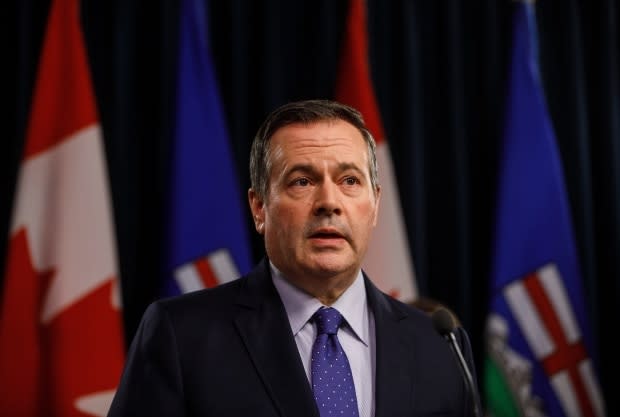OPEC and its allies seek pact to end oil price rout but agreement far from certain
Alberta's energy minister is now exchanging texts with OPEC Secretary-General Mohammed Barkindo.
Sonya Savage made the revelation herself this week as she discussed Thursday's video conference call between OPEC, its allies and a group of non-OPEC countries, which aims to do something about a global oil glut.
It might have been hard to imagine such correspondence happening between the province and the Saudi Arabia-led cartel just a couple of months ago, but these are extraordinarily tough times for the oil sector.
Extraordinary action — the biggest co-ordinated supply production cut in history — is what could be on the table at Thursday's meeting of the OPEC++. Finding an agreement, however, appears to be far from a sure bet.
"I would say I'm 50/50 on whether something comes out of this," said Bill Farren-Price, an expert on OPEC and a director with RS Energy Group, part of Enverus, based in London.
"The market seems to suspect that there will be a positive outcome for prices, which would be a significant cut. I think that is possible. But I also think that there are significant challenges to achieve that cut."
Oil prices have been in a tailspin for weeks as Russia and Saudi Arabia have engaged in a battle over market share, while the COVID-19 pandemic has crushed both economic activity and oil demand.
Global oil demand has dropped by as much as 30 per cent, or about 30 million barrels per day.

It's hard to believe that just last month OPEC and its allies had been discussing further oil output cuts to help stabilize prices. Russia balked at the idea and Saudi Arabia later responded with a massive production boost.
Now, the group is due to hold talks Thursday on how to address the shock of the past few weeks.
Perhaps the biggest challenge is Saudi Arabia, Russia and allied oil producers will agree to deep cuts to their crude output at the talks only if the United States and others join in with curbs to help prop up prices.
"The plan is for them to explore whether they can make an emergency output cut that would put an end to the so-called price war … and whether they can do that in short order," Farren-Price said.
"It will also depend on whether the U.S. and Canada, Brazil, perhaps Norway as well, will also contribute to the cut. What the Saudis are looking for is a major commitment from a wider group of producers."
The White House has already said that it would not interfere in private markets.
But the U.S. Department of Energy has also said American output is falling without government action, though that decline would take place slowly, over the course of the next two years.
Canada has seen its production decline, too.

As Premier Jason Kenney has noted, Alberta has been curtailing crude output for more than a year due to pipeline bottlenecks. Production is now also dropping as oil prices hit record lows in recent weeks.
Some believe production cuts in Western Canadian production could climb into the range of 20 to 25 per cent.
On Wednesday, the president of Canadian Natural Resources said he supports the idea of Canada taking part in an international agreement to reduce production to support global oil prices.
Tim McKay, speaking at the virtual Scotiabank Canadian Association of Petroleum Producers Energy Symposium, said the solution is acceptable as long as it is "broad based" and fair to all participants.
Not everyone in the oilpatch backs the idea, and Kenney said this week that it's his government's view that "the Russians and the Saudis started this fire and they need to put it out."
Kenney said Savage expressed that position to OPEC's secretary general on Sunday.
"However, we will listen," Kenney told the online energy symposium on Tuesday.
"If there is a credible global effort and significant constraint in production, we will keep an open mind about further action on our part, although I think it could at best have a very marginal difference.
"Really, we need to see major leadership from OPEC+ to restore some kind of sanity to global energy markets."
But can OPEC and its allies muster that kind of commitment needed if other oil-producing nations, like the United States and Canada, aren't seen as willing to take part?
There are even questions as to Russia's level of commitment to the talks.
And if major cuts are announced — and adhered to — oil producers will still have to contend with the ongoing fallout from COVID-19's impact on global economies, which could weigh on oil prices for many, many months to come.
There are a lot of ifs.
Still, many in the sector will agree that something needs to be done and soon. Late Wednesday, oil prices climbed on the optimism of Algeria's energy minister saying that Thursday's talks would "be fruitful."
"Under normal circumstances, I would say that it would take more than one bite at the apple to get such a complex, multilateral deal together," Farren-Price said.
"However, the situation is so dire for oil producers … that perhaps this will galvanize policymakers to come together and find some sort of middle way that they can do something."
There are no sure bets in oil markets these days, but there's little doubt there are a lot of motivated players.


